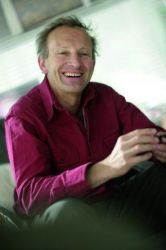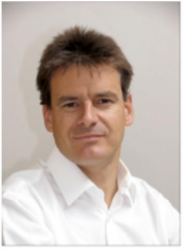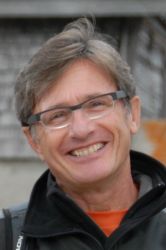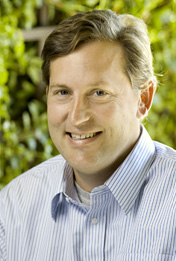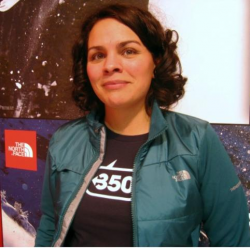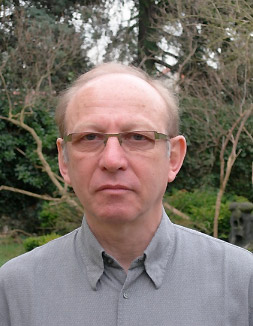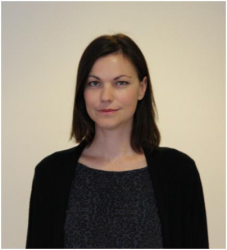|
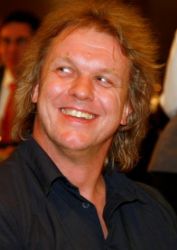
Director of SportKreativWerkstatt
Wednesday 13th October - 10.00-11.00 am: SEMINAR #5
The Future of Outdoor Sports: Structured Forecasting into 2025
PRESENTATION OVERVIEW:
Accurately spotting new market niches years in advance is crucial. It enables your business to be one step ahead of the competition and gain significant early market share.
Early leaders rarely lose their grip on the market, so being prepared in advance for any new technological eventuality is essential for future growth. In this presentation, we’ll look at the main future areas of innovation in outdoor sport, and explain how they can give direction and quality to your future business development.
At the beginning, we’ll introduce a few main principles of the underlying methodological foundation of holistic innovation. Especially important is the idea of system visioning, a technique that can help structure early efforts to recognise new business opportunities.
Fozzy will outline some core innovation fields that are set to be crucial in the next decade or two. These represent a vast corridor of opportunities for improving outdoor activities and business. Examples that are already visible today are U-Health, non-motorized mobility and sustainable mountaineering, and we’ll also look at future innovations such as entertainment hiking, virtual skiing and bio-fun surfaces.
How to tap into these fields on a systemic level is vital to over business success, and the presentation will offer conclusions as to how business development can be restructured into a focused and effective strategy towards a desired outcome.
RESUME:
Prof. Dr. Eckehard Fozzy Moritz is director of SportKreativWerkstatt, a renowned innovation enterprise that works with clients like BMW, BASF, Bosch, Head and the German Skiing Association to stimulate and coordinate innovation projects on national and international levels. He also advises private and political institutions on innovation issues in Germany, Mexico, Spain, and Italy.
In 1994 Moritz received his doctorate from the Tokyo Institute of Technology. Between 1996 and 2000 he was directing the innovatop e.V. – a centre for cooperative and interdisciplinary innovation research, before initiating SportKreativWerkstatt in 2000.
As part of his academic profile, Moritz has held guest professorships in Cincinnati, Bangkok and Puebla, and organized conferences and workshops in 27 countries worldwide. He founded the German Sports Engineering Association and was president until 2007. He was chairman of the 6th World Conference of the International Sports Engineering Association in 2006 and was honoured with professorships in China and Mexico.
Away from the academic arena, Moritz is equally prolific. After his career in American Football in the German League finished, he moved to acrobatics where he is still active today. He trained and performed in countries like Japan, Mongolia, Spain, and Scotland, organized a successful bet in the largest German TV-Show ‘Wetten Dass’, and is still happy to show off in innovative events. He speaks various languages and besides sports loves experimenting, travelling and thinking.
SportKreativWerkstatt
Our vision is to be frontrunner in holistic innovation and as such to realize new solutions that meet the needs of mankind and actively help shape a desired future. Our mission is the systematic development of systemic innovative solutions that meet the demands of society and industry. Core competence includes the development and application of methods for the stimulation and organization of innovation, innovation management in complex settings, and the integration of user needs and user motivation into innovative projects. We have successfully applied our method of holistic innovation in the German and international markets and in the automotive, engineering, industrial production, materials, healthcare, food & beverage, sports, lifestyle and tourism industries. Clients include BMW, Bosch, Daimler, Trumpf, Head, MAN, Adidias, Volkswagen and governmental and regional institutions in Germany, Italy, Spain and Mexico.
Publications
- Moritz, E.F., 2009;
Holistische Innovation - Konzept, Methodik und Beispiele; Springer Verlag, Heidelber
- Moritz, E.F., Haake, S. (Eds.) 2006;
The Engineering of Sport 6, Vol. 1-3; Springer Verlag, New York
- Moritz, E.F. (2006);
Innovatorik für den Spitzensport; Bundesinstitut für Sportwissenschaft, Bonn
- Witte, K., Edelmann-Nusser, J., Sabo, A., Moritz, E.F. (Eds.) 2006;
Sporttechnologie zwischen Theorie und Praxis IV; Shaker Verlag, Aachen
- Gros, H., Edelmann-Nusser, J., Witte, K., Moritz, E.F., Roemer, K. (Eds.) 2004;
Sporttechnologie zwischen Theorie und Praxis III; Shaker Verlag, Aachen
- Moritz, E.F., Edelmann-Nusser, J., Witte, K., Roemer, K. (Eds.) (2004);
Sporttechnologie zwischen Theorie und Praxis II; Shaker Verlag, Aachen
- Roemer, K. , Edelmann-Nusser, J., Witte, K., Moritz, E.F. (Eds.) (2003);
Sporttechnologie zwischen Theorie und Praxis, Shaker Verlag, Aachen
- Ito, Y., Moritz, E.F., Ruth, K (Eds.) (2003);
Synergy of Culture and Production, Vol.2; artefact Verlag, Sottrum
- Moritz, E.F. (Ed.) (2003);
Sports, Culture, and Technology – an Introductory Reader; artefact Verlag, Sottrum
- Kesselring, S., Moritz, E.F., Petzel, W., Vogl, G. (2003);
Kooperative Mobilitätspolitik: Theoretische, empirische und praktische Perspektiven am Beispiel München und Frankfurt, Rhein/Main; IMU-Institut, Heft 3I
- Ito, Y., Moritz, E.F. (Eds.) (1997);
Synergy of Culture and Production, Vol.1; artefact Verlag, Sottrum
- Moritz, E.F., Rauner, F., Spöttl, G. (Eds.) (1997);
Austauschen statt Reparieren: Der "Erfolg" des japanischen KFZ-Service; Donat-Verlag, Bremen
- Moritz, E.F.(1997);
Tokyo verkehrt - Einsichten und Aussichten zur Vergangenheit, Gegenwart und Zukunft von "Mobilität" im Großraum Tokyo; Discussion Paper, Wissenschaftszentrum Berlin für Sozialforschung, Berlin
- Spöttl, G., Rauner, F., Moritz, E.F. (Eds.) (1997);
Vom KFZ-Handwerk zum Qualitätsservice: Der US-amerikanische KFZ-Sektor nach der Trendwende; Donat-Verlag, Bremen
- Moritz, E.F.(1996);
Im Osten nichts Neues - Theorie und Praxis von Produktinnovation in Japan im Vergleich zu Deutschland; artefact-Verlag, Sottrum
Individual Papers and Contributions:
- Innovationen mit Qualität? Die Erzeugung von Qualität durch systematisch geleitete, holistische Innovation; in: Horch, H.-D., Breuer, C., Hovemann, G., Kaiser, S., Roemisch, V.; Qualitätsmanagement im Sport; Tagungsband zum 5. Deutschen Sportökonomie-Kongress, Köln
- Systematic Innovation in Sports Engineering; in: Hubbard, M., Mehta, R.D., Pallis, J.M.; The Engineering of Sport 5; ISEA, Sheffield 2004
- Dojyo: An Innovative Distributed Engineering Project; Contribution to the Intertech Conference, Cincinnati 2004
- Developing a Muscle-Driven Mobility Device for Puebla, Mexico; Contribution to the Conference of the International Institute for Industrial and Manufacturing Culture (IMAC), Duisburg 2004
- Computer Supported Collaborative Sports; Contribution to the 3rd International Conference on Entertainment Computing ICEC 2004, Eindhoven 2004
- Innovation in Sports Equipment – Particularities in Processes and Organization; in: Proceedings of the 4th International Conference on Sports Engineering, Blackwell Science, Kyoto 2002
- Distributed Innovation in Sports Equipment – Dojyo Style; in: Proceedings of IMAC, Nagoya, Japan 2002
- Innovation in Sports Equipment – Bridging Ideas, Expertise, and Application by Utilizing Systematic Design Approaches; Proceedings of the Conference of the International Society of Biomechanics in Sports, San Francisco 2001
- Design of Sports Equipment as a new Academic Field – Challenges and Experiences; Blackwell Science: Proceedings of the 3rd International Conference on Sports Engineering, Sydney 2000
- Team Design Life - How to add Inspiration, Involvement, and Intertainment to an ICED Experience; Proceedings of the 12th International Conference on Engineering Design, München 1999
- Mejorar la capacidad para colaborar en equipos y redes empresariales mediante ejercicios comunes de acrobacia, Second national Conference on Sports Didactics, , Granada, Spain 1998
- The purpose of engineering education; SME International conference on education in manufacturing; San Diego 1998
- Global Challenges for Engineers in the 21st Century; Proceedings of the MM21 conference to commemorate the 100th anniversary of the Japanese Society of Mechanical Engineers, Tokyo (1997);
- How to Achieve Creative Synergy - Contemplations, Cases, and Concepts in Cooperative Design; Proceedings of the 11th International Conference on Engineering Design, Tampere (1997);
- Pooling Competence - Some Practical Implications for Enhancing Cooperative Innovation, in: Brandt, D. (Eds.), Automated Systems Based on Human Skill, 6th IFAC Symposium, Krajnska Gora (1997);
- How to engineer a good engineering education; SME-Conference on Manufacturing Education for the 21st Century; San Diego (1996);
- Approaching an understanding of cultural styles of control development and automated manufacturing in Japan, the USA, and Germany; IFAC World Congress, San Francisco . (1996);
- Technical Creativity in an International Comparative Perspective; Proceedings of the 10th International Conference on Engineering Design, Praha (1995);
- Potentials and Problems of Cooperation in Product Innovation - a Dialogue between Disciplines and Cultures; Joint Symposium of innovatop and the Tokyo Institute of Technology; Dresden (1995);
- Cooperative Production as a New Paragon - Vision or Fiction; 5th IFAC Symposium on Automated Systems Based on Human Skill - Joint Design of Technology and Organization; Berlin .(1995);
- Potentials and Problems of Cooperation between the Japanese and the German Machine Tool Industry; Proceedings of the 1st International Symposium on Thought Model-Based Manufacturing Systems, Tokyo
- Äpfel und Birnen - ein Vergleich des deutschen und japanischen Werkzeugmaschinenbaus; fertigung 12/Dezember, moderne industrie verlag, Landsberg
- Computer Aided Production Management - Innovation and Design; Proceedings der 6th International Conference on Computer-Aided Production Engineering; Edinburgh
Conferences
- Future Potentials in Urban Mobility – Ministry of Transport, Lima, Peru, May 2008
- Systematic Innovation in Sports – Business Program, German Sports University, Cologne, Germany January 2010
- Innovation Potentials in Sustainable Tourism – Lapland Tourism Institute, Rovaniemi, Finland, February 2010
- Systematic Innovation for Small and Medium Sized Enterprises – Ministry of Science and Technology, Toluca, February 2010
|




